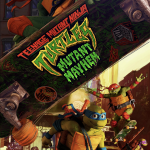When a group of friends discover how to conjure spirits using an embalmed hand, they become hooked on the new thrill, until one of them goes too far and unleashes terrifying supernatural forces.
Chuck says:
From its gut punch of an opening to its poetically ironic ending, directors Danny and Michael Philippou masterfully wring viewers dry with their masterful horror film “Talk to Me.” A bracing examination of addiction and social isolation, this low-budget shocker from Australia has been steadily building positive buzz after a series of film festival screenings. It’s easy to see why, as the sibling filmmakers generate far more than simple jump scares, using their clever premise to deliver biting social commentary.
What with her mother recently dying, Mia (Sophie Wilde) has kept her father at arm’s distance and gravitated towards the security and stability of her friend Jade (Alexandra Jensen). Though being raised by a single mom (Miranda Otto), there’s a foundation to her small family unit, which also includes Riley (Joe Bird), the grieving teen needs. However, this is shaken in the most unexpected of ways. A local party game, in which participants grab a petrified hand and then claim to see dead spirits, has gone viral on social media. Those foolish enough to partake are seen convulsing and speaking in voices obviously not theirs, claiming afterwards to have been momentarily possessed by the spirits of the dead.
Curiosity gets the best of Mia, Jade and Riley and before you know it, they find themselves at a gathering where the owner of the hand is bullying others to grasp the ghastly talisman. Mia is the first and is immediately convinced of the object’s power, seeing a horribly bloated drowning victim, desperate to make a connection with the world of the living.
To say more would ruin the surprises the Philippou’s have in store. An effective metaphor for substance abuse, those who use the hand are eager to come back again and again for more hits from the calcified appendage. It comes as no surprise that Mia speaks to her mother on her second go around, which only fuels her addiction, her habit growing until she becomes obsessed with all the object offers her in the moment, oblivious to the toll it is taking on her mental well-being.
The Philippous utilize the standard tools of the horror trade – low-key lighting, a dark narrative tone, quick editing – for the showstopping possession scenes. However, their camera placement is key, as their increasingly intimate close-ups don’t simply put the agony of the story’s victims front and center but create a sense of claustrophobia for the viewer. The feeling we’re trapped in the room with these boneheaded teens, and we are forced to contend with the horror they’ve drawn forth, is incredibly effective. It’s uncomfortable and nerve-wracking in all the right ways.
Not enough credit is given to the actors in genre exercises but the work here across the board is exceptional, the young cast wholly convincing in conveying the fear and desperation of their characters. Wilde handles the metamorphosis Mia goes through with a ferocity that is something to watch, her fully committed approach as intent as the character’s mania, while Bird is a standout as well, the young man beautifully capturing the agony of feeling left out and then paying the price for his impulsive acts for inclusion.
Isolation drives Mia and Riley’s behavior. Note how often characters are on their phones in the company of others, immersed in their social media milieu, eschewing any sort of one-on-one contact. The pain derived from this 21st century brand of ostracization is at the core of the film, Mia’s desperation to make a sincere emotional connection driving her to extremes. That “Talk’s” teen protagonists come to understand what they’re missing until it’s too late, is perhaps its most accurate feature.
3 1/2 Stars




